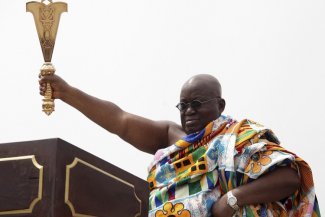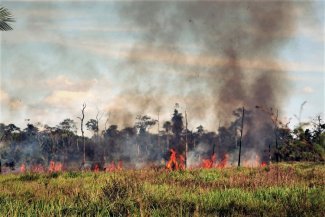The Amazon rainforest is burning – and we are all hypocrites
The fires in the Brazilian state of Rondônia, close to the country’s border with Bolivia, have been burning for more than two weeks. Thousands of hectares of vegetation have been destroyed, like those pictured above, 22 August 2019.
(Corps des pompiers du Rondônia/Esio Mendes)
The images are terrifying, apocalyptic. Columns of flames destroy everything in their path and darken the sky. This is what the end of the world must look like.
Forests burn every year, even tropical rainforests. For thousands of years, humans have been setting fire to trees in order to clear land in the Amazon rainforest and elsewhere. But for the first time the world has begun to notice the catastrophic destruction of the rainforest. This time it’s happening fast – too fast. And humans are no longer able to control the fire that has been raging for weeks, or the consequences of the havoc wrought by their insatiable appetites. Prophets of doom will undoubtedly see it as a metaphor for the fiery destruction of the world that we’ve created.
Forests burn every year, even tropical rainforests. For thousands of years, humans have been setting fire to trees in order to clear land in the Amazon rainforest and elsewhere. But for the first time the world has begun to notice the catastrophic destruction of the rainforest. This time it’s happening fast – too fast. And humans are no longer able to control the fire that has been raging for weeks, or the consequences of the havoc wrought by their insatiable appetites. Prophets of doom will undoubtedly see it as a metaphor for the fiery destruction of the world that we’ve created.
The rainforest is burning because we’ve allowed it to happen. Because for decades, the countries of Latin America, led by Brazil, have failed to prevent deforestation or limit the appetite of agribusiness. Because they’ve been encouraged by the rest of the world to develop productivist agriculture and livestock and to dig for minerals to satisfy our consumer needs. Because the global warming resulting from our uncontrolled emissions of greenhouse gasses causes droughts that create the conditions for fires. Because world leaders continue to ignore the political situation in Brazil as it takes a devastating turn for human rights and the environment. Because the indigenous peoples of America who know how to take care of the “lungs of the earth” need more support in their struggle for which they continue to be murdered and poisoned.
The fires in western Brazil have been set by criminals encouraged by irresponsible leaders who continue to be recognised as legitimate by the international community.
On 10 and 11 August, groups of Brazilian landowners known as latifundiárioslaunched a political action in several Brazilian states: o Dia do fogo, the day of fire. Although the practice of setting fire to the rainforest occurs every year in these vast and remote regions, this year, marked by the beginning of Jair Bolsonaro’s presidency, the practice has grown into an act driven by hatred and nationalism, in which the latifundiáriosaffirm their “power” over nature. “The Amazon rainforest is ours, not yours,” Bolsonaro told members of the foreign press at a press conference in July when asked about an 88 per cent increase in deforestation between June 2018 and June 2019. “Germany is not going to buy the Amazon,” the president went on to proudly state when German Minister of the Environment Svenja Schulze announced the freezing of funds allocated to the Amazon Fund due to lack of cooperation by the new Brazilian government.
The inter-governmental project, created in 2008 by the government of Lula da Silva and more than 90 per cent funded by Norway, is part of the UN’s international cooperation project REDD+aimed at limiting the environmental impact of forest exploitation. With his words and his policy of systematically attacking watchdog groups such as environmental agencies and NGOs, Bolsonaro has encouraged these crimes. Some of the fires were deliberately set in nature reserves and in areas preserved for indigenous peoples, as if to affirm a rejection of any conservation policies deemed to be “unproductive.” Every year, the Jamanxim National Forest is the victim of arson attacks by mineral prospectors and ruralistas who want to clear conservation zones officially protected by the state.
Agro-criminals not only attack forests but also the people that work to protect them such as indigenous peoples, small-scale landless family farmers and environmental activists, including government officials who work for IBAMA (the Brazilian Institute of Environment and Renewable Natural Resources) and the Chico Mendès Institute for Conservation of Biodiversity, who are regular victims of targeted violence.
Action instead of just outrage
On social networks we are now being asked to #PrayForTheAmazon. But the rainforest is not a cathedral that we can rebuild. And its destruction is not an accident. We are all responsible – from those who support or give a platform to climate change deniers (especially those who vote for them) to those who support productivist agriculture, whether as producers, buyers or voters.
European leaders can express their indignation and lecture Bolsonaro or Bolivian President Evo Morales, who has made several concessions allowing deforestation to take place, including recently authorising the practice of slash-and-burn farming. But these same leaders, like French President Emmanuel Macron, are signing free trade agreements widely considered to insufficiently take into account environmental concerns, such as the agreements with Canada (CETA) and with the Mercosur countries of Argentina, Brazil, Paraguay and Uruguay. The latter has yet to be officially approved by France, and while President Macron may indeed be outraged that his Brazilian counterpart “lied” to him about his climate commitments, information on the extent of the devastation of South America’s ecosystems exists and has been available for years. NGOs have been constantly sounding the alarm. The European Union knows this but continues to move forward with these economic agreements that let its multinationals operate while turning a blind eye to the human and ecological impacts on South America.
If our leaders aren’t willing to act to stop the ecocide – and by extension the genocide of indigenous peoples – that has been taking place for so long, it’s up to citizens to act by refusing the buy any imported products (mainly beef, soya and exotic wood) that result from deforestation, including deforestation that is ‘legal’ according to laws written by politicians with ties to agribusiness.
This is what the indigenous peoples of Brazil are now urging. And they can’t resist alone. It’s up to citizens to demand that rules reducing our carbon emissions are respected and expanded. The protests currently taking place in front of Brazil’s embassies must continue as long as necessary until the Brazilian government (and all those who support it directly or indirectly) are made to listen to reason.
Whether nationalists, colonialists and capitalists like it or not, the Amazon rainforest doesn’t belong to anyone – we belong to it. It gives us our air, our water, enriches our sciences with its biodiversity and our culture with its ethnological history, and keeps our planet in balance. We can no longer stand idly by or worse yet, continue to contribute to the problem. Turning a blind eye is no longer an option.






No comments:
Post a Comment